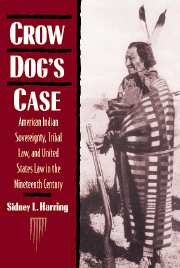 Crow Dog's Case
Crow Dog's Case Published online by Cambridge University Press: 23 September 2009
If legal scholars are not in agreement about the meaning of Crow Dog, the same cannot be said for United States v. Kagama. This case, decided on May 10, 1886, is known as the Supreme Court's first statement of the plenary power doctrine, the principle that Congress's power over Indian affairs is unlimited by treaty rights or tribal sovereignty. As one of the most important cases in federal Indian law, Kagama stands for principles opposite those advanced in Crow Dog and Worcester. Kagama left Indian tribes mere “wards” of the federal government, totally dependent on the will of Congress, which could assert its political power even to their termination as tribes and the expropriation of their lands without compensation. Kagama is the judicial embodiment of Congress's policy of forcing the assimilation of the tribes, recognizing none of their sovereignty, none of their status as domestic nations.
Kagama and Crow Dog are closely linked, not only as products of the same Court, a little more than two years apart, but also doctrinally in that Kagama represents the judicial approval of the Major Crimes Act, the congressional restriction of the sovereignty of tribal law that the Court had recognized in Crow Dog. The Court itself in Crow Dog specifically stated that Congress had the power to extend federal criminal law in Indian country if it chose to do so, citing congressional extension of federal liquor laws to Indian country without the consent of the tribes in United States v Forty-three Gallons of Whiskey (1876)..
To save this book to your Kindle, first ensure [email protected] is added to your Approved Personal Document E-mail List under your Personal Document Settings on the Manage Your Content and Devices page of your Amazon account. Then enter the ‘name’ part of your Kindle email address below. Find out more about saving to your Kindle.
Note you can select to save to either the @free.kindle.com or @kindle.com variations. ‘@free.kindle.com’ emails are free but can only be saved to your device when it is connected to wi-fi. ‘@kindle.com’ emails can be delivered even when you are not connected to wi-fi, but note that service fees apply.
Find out more about the Kindle Personal Document Service.
To save content items to your account, please confirm that you agree to abide by our usage policies. If this is the first time you use this feature, you will be asked to authorise Cambridge Core to connect with your account. Find out more about saving content to Dropbox.
To save content items to your account, please confirm that you agree to abide by our usage policies. If this is the first time you use this feature, you will be asked to authorise Cambridge Core to connect with your account. Find out more about saving content to Google Drive.